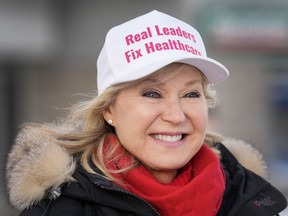Ford should be mindful of how important health care is to voters
Article content
Ontario Premier Doug Ford officially launched his re-election campaign in Windsor, Wednesday in front of the Ambassador Bridge. Standing at the podium in front of a “Protect Ontario” sign, he told the crowd that he couldn’t imagine a better place to start his campaign than the manufacturing city. He asked the people of Ontario for “their trust” and for a “strong stable four-year mandate to do whatever it takes” to protect the province. The entire campaign kick-off was focused on Trump’s potential tariffs. Ford also mentioned priorities such as cutting red tape and streamlining approvals to “get big things built fast” and “fighting the job-killing Liberal carbon tax.” At no point in his campaign launch speech did Ford mention Ontario’s crisis in health care.
Advertisement 2
Article content
Ford did, however, respond to a reporter’s question about his progress on health care. The Progressive Conservative leader described a $1.8 billion plan to connect every person to a family doctor. He added that when he took office, “health care was an absolute disaster,” and that since his government has added more medical schools and seats, registered more than 15,000 doctors, added 100,000 more nurses, and he pointed out that 30,000 more students get their education paid for if they practice in needed areas. He told the crowd that his party is spending $50 billion dollars on hospital sites across the province and putting $33 billion more in health-care funding than any other government in the history of Ontario.
However, critics complain it still hasn’t been enough.
The Ontario Medical Association issued a statement Wednesday stating “the shortage of doctors in Ontario has shown no improvement in the past year,” urged action, and provided an alarming list of 2,600 physician vacancies across the province.
While Ford is keen to play to his strengths and campaign on fighting the tariff threat from the U.S., recent public opinion polls suggest he could be underestimating the importance of health care to voters.
Article content
Advertisement 3
Article content
An Abacus survey released Wednesday showed that directly below the top concern for Ontarians — cost of living at 60 per cent — is improving the health-care system overall at 40 per cent.
Ford may need to be clearer and more ambitious about his plans to fend off the opposition, who are eager to make the campaign more about health care, over pushing back against the threat of tariffs.
Right out of the gate, Liberal Leader Bonnie Crombie launched her campaign in Barrie Wednesday, centring her speech around health care. She approached the podium which read, “More doctors for you. Team Bonnie.” She wore a white hat with the slogan,” Real leaders fix healthcare.” She was accompanied by Dr. Rose Zacharias, a family doctor who will be running in Barrie where 55,000 people do not have a family doctor. Zacharias told the audience that nearly three million Ontarians do not have family doctor. Crombie told the crowd that her party has a four-year plan aimed at creating 3,100 doctors in family medicine and team care that will cost as much as the $200 pre-election cheques, referring to Ford’s taxpayer rebates. Crombie’s plan sounds ambitious, but it lacks the specificity required to convince Ontarians she isn’t just making more empty political promises.
Advertisement 4
Article content
NDP Leader Marit Stiles’ podium simply read, “Marit Stiles for premier.” Her speech was vague when it came to policies. Stiles suggested that a vote for her was a vote to “
Crombie’s Liberals currently sit at 24 per cent while Stiles’ NDP are hovering at 19 per cent according to a recent Abacus poll, both trailing well behind Ford’s PC’s at 47 per cent.
While the Ontario election has been called under unique circumstances, the outcomes of two other provincial elections show just how important health care can be once a campaign is underway. Ambitious clear plans that and strong rhetoric that focused on improving provincial health care no doubt tipped the scales in favour of both Tim Houston’s Nova Scotia Progressive Conservatives and Susan Holt’s New Brunswick Liberals’ campaigns last year.
Advertisement 5
Article content
Promises to “Go like hell,” to get health care fixed were part of Tim Houston’s approach in Nova Scotia. And it paid off. He told his team: “Go as fast as you can to get this fixed. If there’s any hurdles in your way, let me know. If it requires legislation, let me know.” Houston was very specific. He met with colleges, universities, associations and the health leadership across the province. When pressed for details, Houston told CBC’s Katie Simpson that his plans were to make sure pharmacists can do more in terms of scope, to stop turf wars in the system, to improve emergency room services, patient care, training, retention, recruitment, and and to it, he brought all stakeholders together for their input. His incumbent government wasn’t only re-elected, but gained popularity, jumping nine seats from 34 to 43.
Likewise, a complete health-care system overhaul was a major part of Susan Holt’s winning approach in New Brunswick. She promised to establish and support 30 community care clinics, increase the time emergency rooms are open, invest in modern technology, improve the compensation model for physicians, and offered retention bonuses for nurses. Again, specific and ambitious. Her party jumped 15 seats from 16 to 31.
Advertisement 6
Article content
Neither Crombie nor Stiles’s plans are quite as ambitious or specific as Houston’s and Holt’s were, but it’s still early. And, they have the added benefit of not already being the incumbent whose governed over a health-care system on life support for nearly seven years.
Ford has come out with guns blazing ready to fight tariffs with his “Canada is not for sale” cap, and he is riding high on goodwill generated from the leadership role he has played in recent months, advocating for Canada against the Americans. But Ford didn’t have to call this election only two-and-a-half years into his term, and doing so may annoy those who support him, but his support may persist, largely because the two opposition leaders leave much to be desired.
If Ford ignores health care, in favour of positioning himself as negotiator of Trump’s tariffs, he may do so at his peril.
National Post
tnewman@postmedia.com
X: @TLNewmanMTL
Recommended from Editorial
Article content









